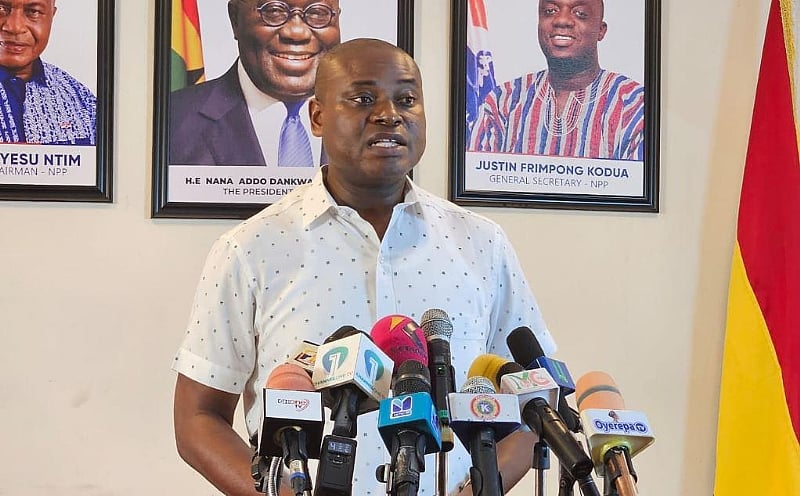Richard Ahiagbah, the National Communications Director of Ghana’s New Patriotic Party (NPP), has vehemently criticized the National Security apparatus for what he perceives as a targeted campaign of intimidation against members of the opposition party. This criticism arises from a perceived double standard in the application of law and the protection afforded to individuals based on their political affiliations. Ahiagbah pointed to the case of US-based social media personality Kevin Taylor, known for his often controversial commentary critical of previous Ghanaian governments, including the NPP. Despite the potentially inflammatory nature of Taylor’s remarks, he was reportedly provided security protection by the same National Security operatives now pursuing NPP activists. This protection, according to Ahiagbah, stands in stark contrast to the treatment meted out to NPP members who have been arrested and prosecuted for statements deemed far less provocative than those made by Taylor.
Ahiagbah’s accusations highlight a growing concern within the NPP regarding the alleged politicization of state security forces. He argues that the National Democratic Congress (NDC), the current ruling party, is instrumentally using these forces to silence dissent and suppress opposition voices. The recent arrests of several pro-NPP social media activists, including individuals known as Sir Obama Pokuase and Fante Comedy, further fuel these concerns. These arrests, ostensibly related to comments made about an August 6 military helicopter crash and alleged illegal possession of firearms, are viewed by the NPP as politically motivated, given the perceived leniency shown to individuals aligned with the NDC. The case of Emmanuel Kwakye Asare, a journalist with the pro-NPP Wontumi FM, adds another layer to this narrative. Asare’s detention for two weeks and subsequent release on a substantial bail amount further strengthens the perception of selective application of justice and an attempt to stifle critical voices.
The core of Ahiagbah’s argument revolves around the principle of equal treatment under the law. He contends that while the government has a legitimate right to investigate and prosecute individuals for violations of the law, this process must be applied impartially, regardless of political affiliation. The alleged disparity in treatment between pro-NPP activists and individuals like Kevin Taylor, perceived as having a favorable relationship with the ruling NDC, undermines the public’s trust in the fairness and independence of state institutions. This perceived bias creates an environment of fear and self-censorship, where individuals are hesitant to express their views for fear of reprisal. Such an environment, Ahiagbah warns, is detrimental to the health of Ghana’s democracy.
The NPP’s concerns extend beyond the specific individuals arrested. The party views these incidents as part of a broader pattern of intimidation and an attempt to create a chilling effect on free speech. Ahiagbah’s call for an end to what he terms “selective justice” reflects a fundamental concern about the preservation of democratic rights and freedoms. He argues that the current climate of perceived persecution discourages open dialogue and critical engagement with political issues, ultimately hindering the country’s democratic progress. The ability to freely express opinions, even those considered controversial, is a cornerstone of a healthy democracy, and its suppression, regardless of political motivation, poses a serious threat to the long-term stability and prosperity of the nation.
The clash between the NPP and the National Security apparatus underscores the delicate balance between maintaining law and order and safeguarding fundamental freedoms. While the government has a responsibility to address legitimate security concerns and investigate potential criminal activity, these actions must be carried out transparently and without any hint of political bias. The perception of selective enforcement erodes public trust in the institutions tasked with upholding the rule of law and creates an environment of suspicion and division. By highlighting the alleged disparity in treatment between pro-NPP activists and individuals perceived to be aligned with the ruling party, Ahiagbah seeks to draw attention to what the NPP perceives as a dangerous erosion of democratic principles.
The NPP’s accusations represent a serious challenge to the integrity of Ghana’s democratic processes. The allegations of politically motivated arrests and selective application of justice warrant thorough investigation and transparent accountability. A credible and independent inquiry into these claims is essential to restore public trust and ensure that the fundamental rights of all citizens are protected, regardless of their political affiliations. The government’s response to these allegations will be a critical test of its commitment to upholding democratic values and ensuring the fair and impartial application of the law. The future of Ghana’s democracy may well depend on its ability to address these concerns and safeguard the freedoms that underpin a just and equitable society.


